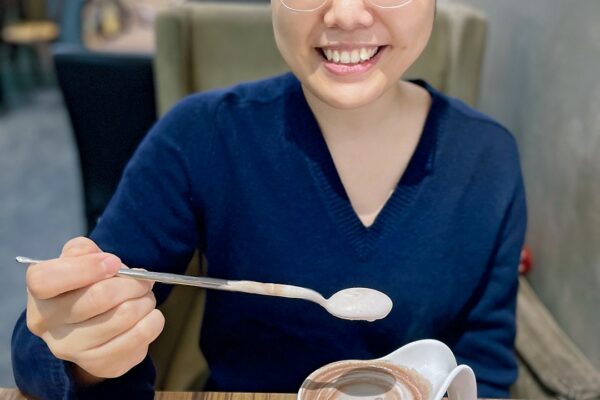By Hong Jing-jing
Edited and translated by Wu Hsiao-ting
Photos by Hsiao Yiu-hwa
For 18 years, Tzu Chi volunteers have consistently supported a family with mental disabilities and schizophrenia, refusing to give up despite the challenges.

Tzu Chi volunteers Yang Qing-yun (left) and Xu Shi-mei (center) visited Quinn on a rainy night, bringing her warmth and support.
Jade, an 80-year-old single mother, once had five children. Unfortunately, one of them has passed away due to illness, and three others suffer from multiple coexisting conditions, including schizophrenia, mental disabilities, and diabetes. The only exception to these challenges is Jade’s third daughter, who is married and unaffected by these health concerns. Tzu Chi volunteers, including Yang Qing-yun (楊清雲) and Xu Shi-mei (徐柿妹), have been providing care and support to this struggling family since 2005.
Despite the challenges they face, Jade never once spoke about her children’s mental health issues when volunteers first started visiting the family. Yang Qing-yun and her fellow volunteers were aware of the family’s situation but refrained from broaching the sensitive topic, mindful of the pain it might cause Jade.
That changed during one of their visits to the family, when the volunteers noticed bruises around Jade’s eyes. At last, the mother opened up and confided that her second daughter had had an episode that day, throwing offerings from the living room altar to the floor and even physically harming her.
Volunteer Xu Shi-mei explained that after Jade’s husband passed away in 1995, she single-handedly supported their four children without any complaints. Her profound motherly love deeply touched those around her. Rather than focusing on her challenges, she always asked others not to worry about her, mentioning that she and her children managed well by relying on government support for low-income households and individuals with disabilities, as well as her earnings from collecting recycling and assisting neighbors with garbage disposal.
Sadly, Jade fell ill herself in 2010, diagnosed with depression and experiencing difficulty in eating. As a result, she had to be placed in a senior care center, unable to continue caring for her eldest son, who at the time still heavily relied on her support. He was subsequently sent to a mental health facility. However, within this family, there are still individuals whom Jade can’t help but worry about.
Quinn was deeply worried during her daughter’s hospitalization, experiencing insomnia and loss of appetite. Xu Shi-mei (left in Photo 1) and Yang Qing-yun (center in Photo 1) frequently visited her to offer their support. On one occasion, they brought an electric cooker and ingredients (Photo 2) and taught her how to prepare simple meals with the device.
Behind the closed door
“During the years when we regularly visited Jade at her home,” Yang recounted, “we only saw Quinn, Jade’s fourth daughter, a few times. Quinn and her two daughters mostly stayed locked in their room during our visits, leaving us with no chance to talk to them.” Yang explained that Quinn has a mild mental disability and had endured domestic violence from her ex-husband, which ultimately led to their divorce. Afterward, she returned to her mother’s home with her two young daughters, who had not yet started elementary school at the time. However, when Jade was placed in a care facility, Quinn’s older sister, who suffers from schizophrenia, sometimes hit Quinn during her episodes. Consequently, Quinn had no choice but to move out of her mother’s home again and rent a place to live with her daughters.
Quinn later revealed to Yang and other volunteers that her younger daughter, An’an, had experienced episodes similar to those of her older brother and sister. It feels like an unbreakable shackle, an inescapable destiny—three generations of Quinn’s family affected by mental issues.
Quinn originally worked in a school kitchen, but her income was affected when the kitchen closed during winter and summer vacations. The situation improved after she switched to a job as a housekeeper at a hotel. Quinn is quiet and reserved, with delayed reactions and a tendency to feel nervous and anxious. When Yang and Xu express their concern for her, asking questions like, “How is work going?” or “How are your children doing?” Quinn often just responds with nods or shakes of her head, or asks them to repeat their questions: “What did you say? Say it again.” Sometimes, she provides a brief response: “There isn’t much to share,” before retreating into silence again.
Whenever volunteers visited Quinn, they always noticed her two daughters hiding behind her, reluctant to let them get close to them and unwilling to respond to any questions. The mother and daughters seldom received visitors and preferred staying at home. The younger daughter, An’an, had been diagnosed as being mildly mentally challenged and attended a special education class at school. The older daughter had problems of her own and sought psychiatric help, but it wasn’t consistent. The two daughters frequently clashed with each other. Eventually, the older daughter, Lijuan, dropped out of school and ran away from home in 2018. She now rarely returns home. Though Quinn loves her children deeply, she feels powerless to be a better parent.
Before Lijuan ran away, Yang and Xu had spared no effort in encouraging the two sisters to participate in Tzu Chi’s tutoring classes and activities for teenagers. They also helped An’an, who was falling behind in her studies, apply for Tzu Chi’s New Shoots Scholarships. However, the two sisters showed little interest in these opportunities.
An’an has since graduated from a vocational high school, but has grown even more quiet than before. Every time volunteers visit her and her mother, she remains seated on the edge of her bed, gazing intently at the volunteers without making any movements. Xu encourages An’an to help with household chores and invites her to volunteer at a local Tzu Chi Jing Si Hall, hoping to increase her interactions with others and enhance her opportunities to find work. Regrettably, after three visits to the Jing Si Hall, An’an declined to go there again.
Yang and Xu had once hoped to learn more about An’an from Quinn so that they could better provide care for her, but to no avail. When An’an was still in school, Yang and Xu speculated that she might have been bullied by classmates. However, Quinn’s understanding and ability to express herself were limited, and she couldn’t provide a clear account of the whole incident. The best she could offer about her daughter was: “She throws tantrums and cries a lot,” and “She doesn’t wear clothes after taking a shower.”
“During the past few years, I had this unsettling feeling that something bad might happen to this family,” said Yang, as she observed An’an growing increasingly withdrawn, with vacant and lost eyes. Her concerns eventually became a reality.
A few months ago, An’an suddenly experienced a violent outburst, losing control and damaging items in the house, even throwing money out of a window and tugging hard at a steel roll-up door downstairs. In a state of panic, Quinn called the police, and An’an was forcibly taken to the hospital. During her hospitalization, An’an adamantly resisted any form of treatment and neglected her personal hygiene. The hospital had no choice but to recommend a transfer. At the second hospital, An’an began displaying self-harming behaviors.
Whether it was accompanying An’an for medical treatment, seeking a temporary shelter facility for her, applying for social welfare assistance, or helping the mother and daughter find a new place to rent after their landlord gave them an eviction notice, Tzu Chi volunteers and social workers have collaborated repeatedly to support them in overcoming the challenges.

Yang Qing-yun and Xu Shi-mei support and encourage each other on the path of providing care for Quinn and her family. They know that if they give up, this family might have a bleaker future.
There will always be a way forward
Xu said that over the 18 years of caring for Jade, Quinn, and their family, the volunteer team has often encountered a lack of engagement, leading to feelings of powerlessness. When confronted with seemingly insurmountable obstacles, she sometimes feels like giving up. However, upon reflection, she always encourages her fellow volunteers to persevere, stressing that their collaborative support brings hope for the family’s future.
“Children suffering from mental illness bring lifelong pain to their parents,” Xu said. She deeply empathizes with families that have members with mental illness due to personal experience. Among her in-laws’ eight children, the second eldest was the most intelligent and performed the best academically. However, the pressure of academics might have been too much for him, leading to the onset of schizophrenia during his sophomore year in high school.
After getting married, Xu and her husband lived with her in-laws. She watched how her father-in-law took care of her brother-in-law. Later, she herself assumed the responsibility of caring for him, a role she fulfilled for 25 years. The frustrations and emotional pain she experienced were indescribable, which deepened her understanding and compassion for families facing similar situations.
There was limited understanding of mental illness in Taiwanese society many decades ago. Xu’s mother-in-law mistakenly believed that Western medical treatment for mental illness invariably involved electric shock, causing her and her husband to delay seeking help for their son due to the fear of the treatment’s supposed cruelty. They were unaware that their son not only had schizophrenia but also obsessive-compulsive disorder. The latter condition caused him to spend a lot of time in the bathroom washing his hands, leading to frequent conflicts between him and his father. Despite his mental issues, his father loved him dearly. When the latter was on his death bed, he worried about who would care for his son once he passed away. It was only after Xu assured him that she would take up the responsibility of caring for him that he found peace and passed away.
Xu took her brother-in-law to seek medical help, and his condition stabilized with medication. However, his compulsive habits of handwashing and wiping water on himself remained unchanged, leading to cellulitis infections and persistent ulcers on his ankles. Xu diligently applied medication and dressed his lesions twice a day, but he often immediately resumed playing with water, undoing her efforts. She had to continually clean up after him, such as thoroughly tidying a bathroom only to find it a mess again the next day. Such challenges were both frustrating and emotionally taxing.
As society changes and life pressures increase, volunteers are encountering more families with members who have mental disorders. They regularly participate in discussions about relevant social welfare issues and caring techniques, seeking help from professional social workers when faced with difficult situations.
Wang Shu-ye (王淑曄), a social worker at the Tzu Chi Taipei office, emphasized that in the case of An’an, medical treatment is currently the priority. Preliminary assessments by doctors indicate that her condition might not be limited to a mild mental disability, necessitating a reevaluation. Meanwhile, a government resource center for the disabled is helping the family apply for low-income subsidies and to assess the possibility of arranging a day care center for An’an upon her discharge from the hospital. If the family encounters any difficulties during this process, Tzu Chi is ready to provide assistance.
Volunteers have steadfastly accompanied this family for the past 18 years, witnessing Jade reach the age of 80, while the volunteers themselves, who once had black hair, now sport gray hair. The causes of mental disorders are intricate and diverse, requiring the volunteers to proceed with utmost caution, navigating each step as if crossing a river on foot. Despite the challenges, Yang firmly believes: “There will always be a way forward!”



